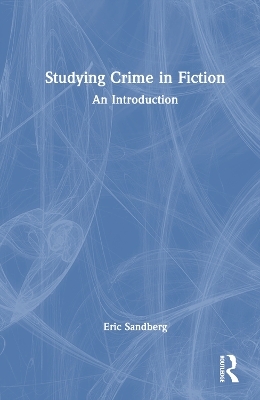
Studying Crime in Fiction
Routledge (Verlag)
978-0-367-74210-2 (ISBN)
The primary aim of Studying Crime in Fiction: An Introduction is to introduce the emerging cross-disciplinary area of study that combines the fields of crime fiction studies and criminology. The study of crime fiction as a genre has a long history within literary studies, and is becoming increasingly prominent in twenty-first-century scholarship. Less attention, however, has been paid to the ways in which elements of criminology, or the systematic study of crime and criminal behaviour from a wide range of perspectives, have influenced the production and reception of crime narratives. Similarly, not enough attention has been paid to the ways in which crime fiction as a genre can inform and enliven the study of criminology. Written largely for undergraduate and graduate students, but also for scholars of crime fiction and criminology interested in thinking across disciplinary boundaries, Studying Crime in Fiction: An Introduction provides full coverage of the backgrounds of the related fields of crime fiction studies and criminology, and explores the many ways they are reciprocally illuminating.
The four main chapters in Section 1 (Orient You) familiarize readers with the history and contours of the broad fields within which Studying Crime in Fiction: An Introduction operates. It introduces the history of crime and criminology, as well the history of crime fiction and the academic field dedicated to its study. In its final chapter it looks at the ways these areas of study can be conceptually interrelated. Section 2 of the book (Equip You) is dedicated to examining aspects of criminological theory in relation to various forms of crime fiction. It highlights a range of the most relevant theories, paradigms, and problematics of criminology that appear in, shed light on, or can be effectively illuminated through reference to crime fiction. Its five chapters deal with the definition of crime; explanations for crime and criminal behaviour; investigations into crime; the experience of crime; and, finally, punishments for crime. All of these areas are examined alongside examples of crime fiction drawn from across the genre’s history. Section 3 (Enable You) presents six case studies. Each of these reads a work of crime fiction alongside one or more criminological approaches. Each case study is supplemented with a set of questions addressing issues central to the study of crime in fiction.
Eric Sandberg completed his PhD at the University of Edinburgh, and has held positions at universities in Turkey, Japan, and Finland. He is currently Associate Professor at City University of Hong Kong, and also holds a docentship at the University of Oulu, Finland. His research interests range from modernism to the contemporary novel, with a particular focus on crime fiction, adaptation, and nostalgia studies. He has written and edited six books, and his work has appeared in numerous edited collections and journals.
Introduction
Section 1: Orient You
Chapter 1: A History of Crime
Chapter 2: A History of Criminology
Chapter 3: A History of Crime Fiction
Chapter 4: A History of Crime Fiction
Chapter 5: The Criminology of Crime Fiction
Section 2: ‘Equip You’
Chapter 6: Defining Crime
Chapter 7: Explaining Crime
Chapter 8: Investigating Crime
Chapter 9: Experiencing Crime
Chapter 10: Punishing Crime
Section 3 ‘Enable You’
Case Study 1: Arthur Conan Doyle’s The Sign of Four––Imperial Crimes
Case Study 2: Agatha Christie’s Crooked House––Family Crimes
Case Study 3: Walter Mosley’s Devil in a Blue Dress––Racial Crimes
Case Study 4: Maj Sjöwall and Per Wahlöö’s The Man on the Balcony––Social Crimes
Case Study 5: Neal Stephenson’s Zodiac––Environmental Crimes
Case Study 6: Natsuo Kirino’s Out––Gendered Crimes
| Erscheinungsdatum | 06.03.2024 |
|---|---|
| Verlagsort | London |
| Sprache | englisch |
| Maße | 152 x 229 mm |
| Gewicht | 1210 g |
| Themenwelt | Geisteswissenschaften ► Sprach- / Literaturwissenschaft ► Anglistik / Amerikanistik |
| Geisteswissenschaften ► Sprach- / Literaturwissenschaft ► Literaturwissenschaft | |
| Recht / Steuern ► Strafrecht ► Kriminologie | |
| Sozialwissenschaften | |
| ISBN-10 | 0-367-74210-1 / 0367742101 |
| ISBN-13 | 978-0-367-74210-2 / 9780367742102 |
| Zustand | Neuware |
| Haben Sie eine Frage zum Produkt? |
aus dem Bereich


